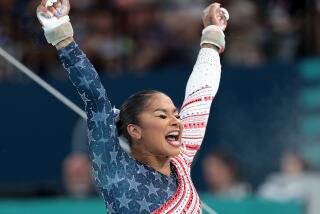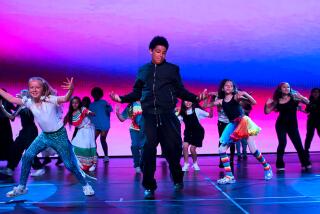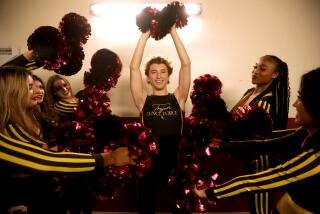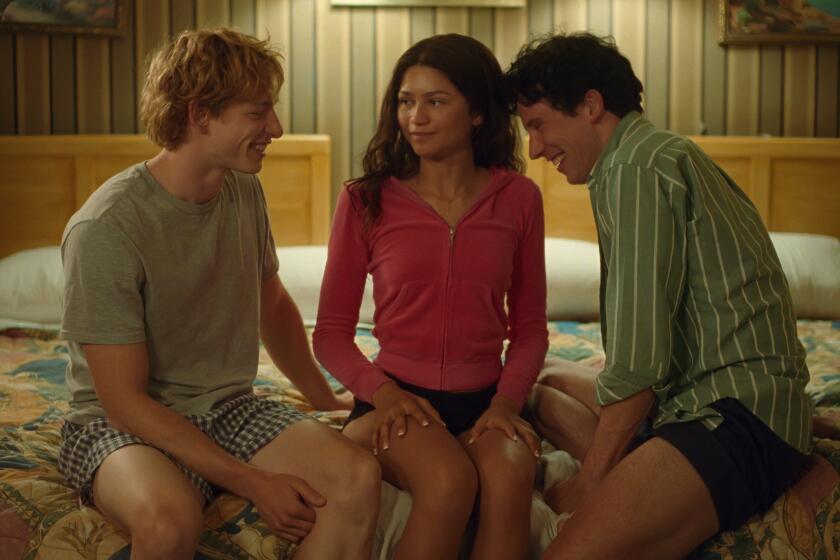David Rousseve embraces the joy and the pain
Ten years ago, David Roussève found himself at risk of contracting “churning-it-out syndrome.” A Los Angeles transplant, he worried that the kind of narrative-driven, deeply personal yet politically resonant dance-theater works that had brought him acclaim in the 1990s New York dance world might start to feel more like textbook exercises if he persisted in creating them.
“I had developed a formula for coupling text with movement, and I felt the danger of my work getting stale,” he said recently. “I needed to take myself out of the spotlight for a while so I could rediscover my reasons for doing this.”
Although Roussève, 49, kept busy -- teaching at UCLA, where he has been a choreography professor since 1996, and creating works for other companies -- he stopped making dances for his own troupe, Reality, which he had founded in 1989. But this week, he will premiere a new work in Los Angeles that simultaneously returns to and departs from where he left off a decade ago. Called “Saudade,” which in Portuguese connotes a kind of bittersweet yearning, it was co-commissioned by UCLA Live and will be presented at the university’s Freud Playhouse.
“Saudade” has been a “long time coming,” said David Sefton, the artistic director of UCLA Live.
Sefton acknowledged it is unusual for UCLA Live to showcase the work of a choreographer laboring in its own backyard. But “it’s nice to have a David Roussève in the mix,” he said. “He’s truly an original, thought-provoking voice, and he’s entitled to his place among the international choreographers we put in the season.”
Roussève, seated in his UCLA office, appeared relaxed and laughed easily when discussing “Saudade” and the resurgence of his artistic mojo. Tall and bespectacled, he wore his gray-streaked, dreadlocked hair in a ponytail and spoke with the slightest of Southern accents. “I got away with murder in my earlier works, which were so agitprop in the way they dealt with race, feminism and other issues,” he recalled, “because I always started my pieces by just talking to the audience as myself. I’d let them know they could trust me, and then the lights would go out and bam, I’d take them to a much larger and darker place.”
‘Always subverting’
“David is always subverting but in a gentle way,” said choreographer Cheng-Chieh Yu, a UCLA colleague. “He pays attention to things and points them out in a way that others don’t. At the same time, he’s always serving as a bridge between people. He has this ability of making everyone hear everyone else’s voice.”
Roussève attributed the genesis of “Saudade” to his father’s funeral in 2004. “My father’s family is from Louisiana, and while there was enormous grief, people were also joyous that my father had crossed over,” he said. “To feel joy and real-world agony at the same time was something I learned growing up as a Southerner, and I decided to do an investigation of ‘bittersweet.’ ”
After he had begun work on his new idea, he said, he happened to attend a fado concert and “fell in love” with the Portuguese folk music so often likened to the blues. “This music is quintessentially bittersweet and so akin to the emotional subtext of my work.”
Unlike with most of his previous work, however, he decided to experiment with movement before trying to write an accompanying text. Fascinated by the “intersection of Western and global cultures” that he had encountered in Los Angeles, he started collaborating with a group of choreographers, most of them former UCLA graduate students with specialties in ethnic dance traditions from Asia and Africa, giving them movement-generating tasks and directing them in explorations of “bittersweet.”
“I wanted to use world dance in my piece but didn’t want to do some postmodern take on it,” he said. “So we’d get in the studio and people would use their own vocabulary on their own bodies.”
Olivier Tarpaga, one of “Saudade’s” cast members and a native of Burkina Faso in West Africa, found this process at once “freeing and challenging. David is a great leader. . . . You’ll laugh, but he reminds me of President Obama because he’s always calm. Some people are great artists but they’re crazy. David happens to be a great artist but the opposite of a drama person in life.”
To create the text, Roussève decamped for Lake Como in Italy, where he composed six monologues about the African American experience, spanning the period from before the Civil War to Hurricane Katrina. Determined to eschew autobiography, he instead created characters to channel his own experiences. Sally the slave, for example, who learns how to read and write even though “it cost the skin off her sister’s back,” draws on his memories of being one of only a dozen black students in a high school class of 717.
‘Connect the dots’
In “Saudade,” Roussève recites these monologues over the course of 90 minutes as he walks a diagonal line across the stage, cutting a swath through the hybridized dances, comic antics and mini-dramas enacted by the seven other performers. All this “can be a challenge for the audience,” he conceded. “It might look like a chaotic mix of blah-blah-blah, but if you can see the subtext and through lines, then you can connect the dots.”
At the end of the show, Roussève performs a short dance solo that he said was growing shorter by the day, since walking super-slowly for an hour and a half was proving to be “the hardest thing I’ve ever done.” The recipient of a double hip replacement, he said he would be performing not for “ego reasons. I wish someone could replace me onstage, but I felt there was a life that I could breathe into these monologues in order to give them their due.”
Indeed, Roussève had considerable training as an actor, beginning with “bad children’s theater” during his childhood in Houston. “I wanted to be a triple threat, but I can’t really sing,” he said, cracking up. “But I think early on, a schism developed in me between doing something fun or worthwhile with my life.”
After graduating from high school, where an enormous need to “fit in” propelled him to the class presidency, Roussève majored in pre-law at Princeton while taking every possible dance and acting class. He also realized his gift for communicating “with all kinds of people without losing my blackness. When I was at Princeton, if you were white you really didn’t have black friends and vice versa,” he said. “But I could have both.”
His post-college life entailed coming out of the closet as a gay man, deferring law school and moving to New York, where he performed both in soap operas and in dance-theater works emblematic of the city’s downtown experimental performance scene. “It was there that I realized I could do something with theater, that I could merge the silly, vaudevillian side of me with the person that wanted to do something meaningful,” he said.
In the mid-’80s, he started to create his own dance-theater works at a time “when no one was saying the things I wanted to say.” Although Bill T. Jones, another African American gay male choreographer, had started attracting attention for his work, role models for Roussève were few. “I liked the experimentation of the downtown performance world, but I was more Motown and less Philip Glass.”
“David was always an individual holding his ground,” said Yu, who performed in New York during the same era and has always admired Roussève for “digging into his own subjectivity. He is definitely a great storyteller.”
These days, Roussève said, he is fairly certain he will have more stories to tell. “Saudade” seems to have alleviated any fears he harbored of burning out.
“I want the next piece I make to reflect me as a California artist,” he said. “I used to be a New York snob. Now I love L.A. It’s a city of the future.”
More to Read
The biggest entertainment stories
Get our big stories about Hollywood, film, television, music, arts, culture and more right in your inbox as soon as they publish.
You may occasionally receive promotional content from the Los Angeles Times.










